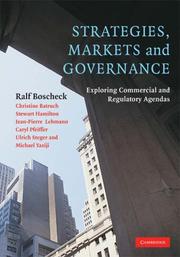| Listing 1 - 2 of 2 |
Sort by
|

ISBN: 9780511753848 9780521868457 9780521688451 9780511397158 0511397151 0521868459 1107179351 1281383708 9786611383701 0511397925 0511400497 0511396422 0511753845 0511398719 0521688450 Year: 2008 Publisher: Cambridge Cambridge University Press
Abstract | Keywords | Export | Availability | Bookmark
 Loading...
Loading...Choose an application
- Reference Manager
- EndNote
- RefWorks (Direct export to RefWorks)
Strategies, Markets and Governance addresses governance concerns at firm, industry, country and international levels. How do regulatory authorities deal with new business models, organizational structures and blurring market relations? What limits regulatory control and what are the implications of corporate self-regulation? What drives the spread of new regulation and what limits its effectiveness? How does 'the organized public' shape political and corporate interests and what is its legitimacy and impact on business? How do corporate strategies turn tighter regulation into profit opportunities, deliver public benefits in the face of predatory states and when is exit the only option left? The contributing authors are leading researchers on governance and public policy, and present assessments of these questions in a variety of institutional and international contexts. The book is ideally suited to advanced students of business, public policy and business regulation, as well as practitioners and policy makers.
New business enterprises. --- Industrial policy --- Business --- Industries --- Industry and state --- Economic policy --- Business starts --- Development stage enterprises --- How to start a business --- New companies --- Start-up business enterprises --- Start-up companies --- Start-ups (Business enterprises) --- Starting a business --- Startups (Business enterprises) --- Business enterprises --- Business incubators --- Government policy --- Industrial policy. --- Trade regulation. --- Corporate governance. --- Governance, Corporate --- Industrial management --- Directors of corporations --- Regulation of trade --- Regulatory reform --- Trade regulation --- Commercial law --- Consumer protection --- Deregulation --- Law and legislation --- Business, Economy and Management --- Business Management
Book
ISBN: 1134506279 0429229089 0415753562 1134506287 0203167058 1280401834 Year: 2002 Publisher: London ; New York : Routledge,
Abstract | Keywords | Export | Availability | Bookmark
 Loading...
Loading...Choose an application
- Reference Manager
- EndNote
- RefWorks (Direct export to RefWorks)
Corporate moves towards focused production and outsourcing, governmental reforms involving privatization and deregulation and the globalization of trade and investments promise large efficiency gains. However, the necessary coordination mechanisms call for regulatory approval and policy guidelines to safeguard these undertakings against abuse, which in turn are held up against the test of administrative efficiency and global regulatory competition. The question is: what standard will ultimately inspire policy, satisfy administration and be acceptable to parties inside and outside of a given co
| Listing 1 - 2 of 2 |
Sort by
|

 Search
Search Feedback
Feedback About UniCat
About UniCat  Help
Help News
News